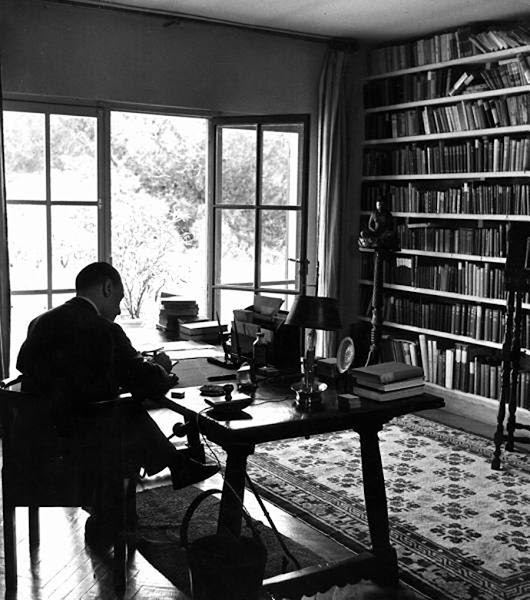The most fundamental delight which literature can offer has something to do with the perception or discovery of truth, not necessarily a profound or complex or earthshaking truth, but a particular truth of some order. This "epiphany" comes at the moment of recognition when the reader's experience is reflected back at him.
This is what happened to me when idly, and to pass the time on a grey day, I picked up, once again, W. Somerset Maugham's "Volume Four - Collected Short Stories", which I had bought for 625 drachmas in Athens when I myself was still a footloose expatriate and living in Greece.
What again attracted me was the short story "Mirage" which tells of another expatriate character from England called Grosely who has spent most of his working life in China but finally decides to return home.
We’re given in the first pages much background detail concerning his early days as a medical student, and what brought him to the Orient in the first place. But the story really only picks up when, after years of very difficult saving and hard work, Grosely is able to travel back to the England he has adored, with the money he has accumulated.
What happens when he eventually arrives, however, is perhaps not all that surprising. London has changed, nothing is where it should be, manners and tastes are apparently more sophisticated. Grosely hates it.
"The old places were gone, the people were different, he found it hard to make friends, he was strangely lonely; he had never expected that in a great city like London. That's what was wrong with it, London had become too big, it wasn't the jolly, intimate place it had been in the early nineties. It had gone to pieces." (click here)
What he does next is really quite interesting. He decides to leave England again and return to Shanghai.
"... somehow he couldn't think of anything else but China. One day he went to the pictures and saw a scene at Shanghai. That settled it. He was fed up with London. He hated it. He was going to get out and this time he'd get out for good. He had been home a year and a half, and it seemed longer to him than all his twenty years in the East." (click here)
En route, he visits places like Singapore and Colombo. But at the last stopping place before China proper - Haiphong - he remains. He’s only supposed to go ashore for forty-eight hours, but he stays.
"I stopped there till my ship went on to Hong-Kong" he said. "And when she left I just stopped on. ... I often think I'll go on to Shanghai some day, but I don’t suppose I ever shall. And God knows, I never want to see England again", he tells the narrator. (click here)
Looking at life through the wreaths of opium smoke that he exhales several times a day, positioned between east and west, undecided where home actually is, Grosely seems to find the in-between existence of Haiphong not only agreeable, but something of an answer. "Those last words of his revealed him to me”, remarks the narrator. "I knew that on the threshold of China his courage had failed him. England had been such a terrible disappointment that now he was afraid to put China to the test too. If that failed him he had nothing. For years England had been like a mirage in the desert. But when he had yielded to the attraction, those shining pools and the palm trees and the green grass were nothing but the rolling sandy dunes. He had China, and so long as he never saw it again he kept it." (click here)
"The mirage shone before his eyes. The illusion held him. He was happy. I wondered what would be his end. Well, that was not yet. For the first time in his life perhaps he held the present in his hand." (click here)
As a former expatriate, who has spent close on twenty years in far-off places, I can relate to Maugham's stories which are taken from real life and which Maugham disguised so little that the rubber-planters of Malaya threatened violence if he ever returned to the peninsula.
To this day I still correspond - these days by email - with some of the expatriates I have known. For some, this became their permanent life and they remain, even in retirement, far from home; others returned home too late and buried their loneliness and their misery in drink.
I don't know what Maugham would've made of me. Perhaps "Riverbend" is my Haiphong, and as long as I never see home again I shall keep it.
"Irgendwo über den Bergen muss meine ferne Heimat sein." Hermann Hesse



